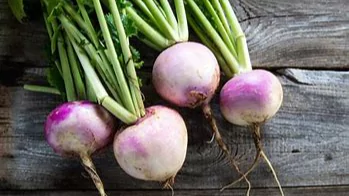Beetroot Vegetable
Beets have gained popularity as the healthiest food. A recent study says that beets and beet juice can improve sports performance, lower blood pressure and increase blood flow. So much so that a growing number of drinks and juices now include this nutrient.
Beet is from the same family as sugar beet. However, it is genetics and different foods. Sugar beets are white and manufacturers often use them to extract sugar to sweeten processed foods. It is impossible to remove sugar from beets, which are usually red or golden.
The scientific name for beets is Beta vulgaris, which means “common beet” in Latin. The ancient red beet root has been cultivated as a food source for centuries, and many cultivars have emerged, including golden beets, which have a rich orange and yellow color. Another rare type of beet is the chioggia or “candy cane” beet, named for the round red and white flesh.
Beets grow underground and are covered with large dark green leaves. Beets grow underground and are covered with large dark green leaves.
Along with other root vegetables, beets can be fried, boiled, steamed and boiled. They are often grown for use in salads and can be added to root vegetable casseroles and similar dishes. Beet greens can be used like chard and other dark greens in dishes from salads to quiches. When you choose beets to eat, look for hard, healthy types that have no retention or deformation, and store them in the refrigerator. If the beets come with any surface, remove them, as they drain the water from the beets.
Beetroot Nutrition facts
Beets are good for you because of their high fiber, vitamin and mineral content. It’s a low-calorie food that’s still filling, helping with weight loss while providing essential nutrients. In one cup of cooked beets, you will get 12% of your daily fiber, 7% of your daily vitamin C, iron, and vitamin B6. You’ll also get 34% of your daily folate, 11% of your daily potassium, and 9% of your daily magnesium. Below is information on the nutrition of raw beets.
Varieties of beets
You are probably familiar with the common beetroot. That’s what comes to mind when you think of beetroot. But, there are many other types of beets that you can find in your grocery store and at farmers markets.

Red beets – the most diverse. Red beets are flexible, earthy, keep well in the refrigerator, and are widely used. They will also cover the entire pink plate, so keep that in mind when using it. Golden Beets – If there are any variety of beets in your grocery store, this should be it. Golden beets are less sweet than red beets, but they are also less salty. They also make cleaning easier because they don’t burn like beetroot does.
Chioggia beets – You will have a beautiful surprise when you crush chioggia beets. The flesh inside them is pink and white in color. They are also a delicious variety and rarely found in grocery stores. Visit your local farmers market to find these beauties.
White beets – Don’t confuse these with turnips as they look very similar. They are not as sweet as other types of beets, and are not available everywhere.
Top Health Advantages From Beetroot
The risk of heart disease may decrease
Beets don’t just have a positive effect on your blood pressure. They are also high in a plant alkaloid called betaine, as well as the B vitamin folate. According to an article published in the Journal of Chiropractic Medicine in March 2013, together, betaine and folate provide a powerful boost in lowering blood levels of homocysteine, a chemical your body uses to produce protein.
At high levels, homocysteine increases the risk of arterial damage and heart disease.
You can improve your energy
When famous athletes pour into the glass for drug tests, the color may be crimson. Why? Because many athletes eat beets, beets contain pigments that turn urine pink.
Research, such as this August 2018 article in the Annual Review of Nutrition, has suggested that the nitrates in beets improve endurance performance. It takes about three to five beets (depending on their size, which varies) to improve performance, says study researcher Andy Jones, PhD, professor of applied physiology and sports and health sciences at the University of Exeter .
Improved brain health
One of the reasons why brain function declines with age or stress is due to reduced blood flow.
The same nitrates that help increase athletic performance can also help increase brain performance because they help increase blood flow. Such studies have shown that a diet high in nitrates leads to increased blood flow to the brain compared to a diet low in nitrates in adults. Specifically, increased blood flow to the part of the brain that is responsible for key functions such as memory, judgment and concentration. So, eat beets the next time you hit all the intelligence levels.
Helps lower blood pressure
As we discussed in some of the other benefits listed, the nitrates in beets help increase blood flow. This increased blood flow will help lower blood pressure.
Studies like this show that blood pressure drops as quickly as a few hours after consuming beets. Its effect lasts only 6 hours. Eating beets regularly in your diet is important to get long-term benefits.
Rich in nitrates
“Beets contain nitrates, which help open blood vessels,” says Thomsen Ferreira. “It can help control blood pressure and can improve sports performance and brain function.”
Studies have shown that drinking beetroot juice before exercise will increase your endurance, allowing you to exercise longer. This is because the nitrates in beets are converted into nitric acid in your body, which increases blood flow. This improves lung function and strengthens muscle contractions. The nitrates in beets will also help lower blood pressure if you have high blood pressure, according to other studies on this vegetable.
In fact, beet juice has been shown in research to reduce systolic and diastolic blood pressure. In addition, foods containing nitrates are associated with better brain function. Because nitrates dilate blood vessels, it allows for increased blood flow to the brain, which is beneficial for cognitive function.


